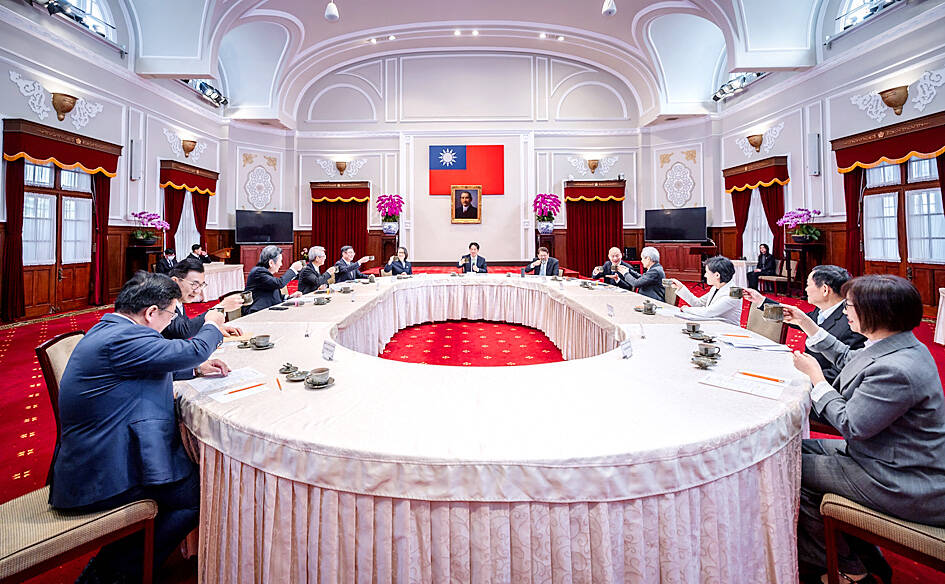President William Lai (賴清德) yesterday emphasized unity as he met with the leaders of the nation’s five branches of government at the Presidential Office in Taipei to discuss national policies.
Lai exercised his constitutional power to call the meeting, hoping to encourage cross-party and intergovernmental cooperation in the face of severe political and economic challenges.
Lai gave a speech emphasizing unity and presented the leaders with gifts before the closed-door meeting began.

Photo: screen grab from the Presidential Office’s Flickr page
“The world faces severe challenges due to geopolitical shocks, the restructuring of supply chains and the rapid development of emerging technologies like artificial intelligence,” Lai said. “Taiwan faces threats from China’s diplomatic and military intimidation, and ‘united front’ infiltration.”
“In the face of these challenges, Taiwan must unite,” he said, adding this was the only way to strengthen Taiwan’s national defense, economy and societal resilience.
He compared the five branches of government to five fingers, each with its own function, but only having strength when working together.
Through the meeting, the five branches can establish “a platform for communication, clarify constitutional boundaries, unite the nation, resolve disputes and jointly seek solutions to problems,” Lai said. “Whether facing external storms or internal disputes, we will firmly and unwaveringly move the nation forward.”
Presidential Office Secretary-General Pan Men-an (潘孟安) in a post-meeting news conference said that the attendees from the government branches all mentioned the difficulties in carrying out their duties and daily operations due to budget freezes and cancelations by the Legislative Yuan.
Legislative Speaker Han Kuo-yu (韓國瑜) expressed the hope that the Executive Yuan would not request reconsiderations, but address problems with follow-up increases or decreases of the budget, Pan said.
Lai has asked Premier Cho Jung-tai (卓榮泰) and Han to conduct interagency negotiations, so the Executive Yuan and the Legislative Yuan could try to resolve the budget issue in a feasible way, he said.
Asked whether the Executive Yuan had promised not to request a reconsideration by the legislature, Pan said that Lai expected to resolve the issues through negotiations before calculating the government’s budget.
Given Han’s wisdom, vision and rich experience in the legislature, he must be able to achieve consensus among the governing and opposition parties to create a win-win result, Pan said.
Presidential Office Deputy Secretary-General Xavier Chang (張惇涵) said that Cho and Han did not settle on “a solution that rules out reconsiderations,” but they agreed with Lai’s proposal to conduct negotiations between the Cabinet and the legislature to find a solution.
Asked about the opposition’s suggestion that negotiations among leaders of the governing and opposition parties should first be held, Pan said the budget issue would for now be handled by the Executive Yuan, Legislative Yuan, Control Yuan, Judicial Yuan and Examination Yuan.
Whether to start a dialogue among party leaders depends on future developments, he said, adding the issue was not mentioned at the meeting.
Asked whether interagency negotiations would be normalized, Pan cited Lai as saying that the meeting was convened with the authority granted by the Constitution to the president to gather the leaders to discuss national policies.
Whether it is called an interagency negotiation or national policy discussion, the common purpose is to resolve problems for the good of Taiwan, Pan said.

The Central Election Commission has amended election and recall regulations to require elected office candidates to provide proof that they have no Chinese citizenship, a Cabinet report said. The commission on Oct. 29 last year revised the Measures for the Permission of Family-based Residence, Long-term Residence and Settlement of People from the Mainland Area in the Taiwan Area (大陸地區人民在台灣地區依親居留長期居留或定居許可辦法), the Executive Yuan said in a report it submitted to the legislature for review. The revision requires Chinese citizens applying for permanent residency to submit notarial documents showing that they have lost their Chinese household record and have renounced — or have never

A magnitude 5.6 earthquake struck off the coast of Yilan County at 12:37pm today, with clear shaking felt across much of northern Taiwan. There were no immediate reports of damage. The epicenter of the quake was 16.9km east-southeast of Yilan County Hall offshore at a depth of 66.8km, Central Weather Administration (CWA) data showed. The maximum intensity registered at a 4 in Yilan County’s Nanao Township (南澳) on Taiwan’s seven-tier scale. Other parts of Yilan, as well as certain areas of Hualien County, Taipei, New Taipei City, Taoyuan, Hsinchu County, Taichung and Miaoli County, recorded intensities of 3. Residents of Yilan County and Taipei received

Taiwan has secured another breakthrough in fruit exports, with jujubes, dragon fruit and lychees approved for shipment to the EU, the Ministry of Agriculture said yesterday. The Animal and Plant Health Inspection Agency on Thursday received formal notification of the approval from the EU, the ministry said, adding that the decision was expected to expand Taiwanese fruit producers’ access to high-end European markets. Taiwan exported 126 tonnes of lychees last year, valued at US$1.48 million, with Japan accounting for 102 tonnes. Other export destinations included New Zealand, Hong Kong, the US and Australia, ministry data showed. Jujube exports totaled 103 tonnes, valued at

BIG SPENDERS: Foreign investors bought the most Taiwan equities since 2005, signaling confidence that an AI boom would continue to benefit chipmakers Taiwan Semiconductor Manufacturing Co’s (TSMC, 台積電) market capitalization swelled to US$2 trillion for the first time following a 4.25 percent rally in its American depositary receipts (ADR) overnight, putting the world’s biggest contract chipmaker sixth on the list of the world’s biggest companies by market capitalization, just behind Amazon.com Inc. The site CompaniesMarketcap.com ranked TSMC ahead of Saudi Aramco and Meta Platforms Inc. The Taiwanese company’s ADRs on Tuesday surged to US$385.75 on the New York Stock Exchange, as strong demand for artificial intelligence (AI) applications led to chip supply constraints and boost revenue growth to record-breaking levels. Each TSMC ADR represents